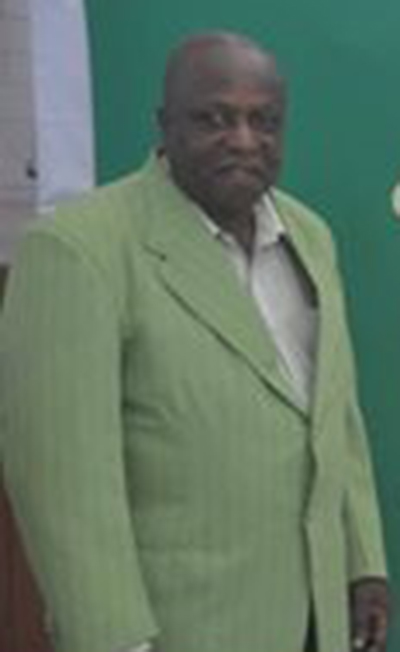As the chief counsellor of the Salvation Army Drug Rehabilitation Centre John Greaves saw firsthand the havoc drug addiction wrought on people’s lives and even as he fought to save them, he was inspired to do more to prevent men and women becoming addicts.
Not one to sit around and toy with an idea, in just about two years after he took up the position as chief counsellor, Greaves shared his vision with others and the Social Life Issues guidance and counselling was formed.
“It was while I was functioning as counsellor that I said to myself why sit here enrolling and admitting young men every day who are already addicts? Then the inspiration came to me, why not step out and do something to reduce the traffic of men who are being addicted,” Greaves told Stabroek Weekend in an interview.

Out of that line of thinking, the theme ‘nipping it in the bud’ was birthed and the inspiration went further.
With a wide professional background inclusive of stints in the Guyana Defence Force and as a religious minister under his belt, Greaves stepped out in 2012 and his organisation was formally launched in 2013. It was later registered with an executive that included two recovering addicts.
While there are many success stories, Greaves’ six-year-old organisation has faced some trying times but he believes that the services provided are needed. And even though many months he has to use his own finances to keep the 193 Charlotte and Wellington streets location open, he vows to continue fighting.
As the name suggests, Social Life Issues does not only focus on drug addiction as it was recognised early on that there are a number of social ills that come into play that need addressing. Greaves’ wife works at Mercy Wings Vocational School and that is the first school that allowed the organisation to have direct contact with students as it explored the ‘nipping in the bud’ theme.
Recognising this initiative was bearing fruits, Greaves said, they saw the need to expand as the vison was not about dealing with addicts alone but about reducing the possibility of persons becoming addicts.
“We found favour with seven private secondary schools initially, and we did weekly presentations at each school. After the first year, we reviewed our success rate by having an evaluation done at the schools with the principals who had confessed to having knowledge that drugs, including alcohol, were being used by some students, and they acknowledged that they had seen marked reduction in the youngsters’ intake of drugs, especially alcohol,” Greaves said.
‘Drug prevention through education’
The platform of the organisation is “drug prevention through education” but Greaves said that over time there has been a move into broad-based counselling since 75% of the executive members are professional social workers and there is also a psychologist available. “And so, we consider ourselves equipped to deal with any social issues as far as possible,” he added.
He shared that out of the school presentations, it became necessary to do some counselling, because they recognised that there are users in the schools. In collaboration with principals and with parents’ involvement the affected children were referred to the organisation for counselling.
“It was not just presentations, but they had dialogues and children admitted to being users,” he said.
He revealed that at one school out of a number of 70 some 40 children indicated that they have used drugs and the principal stated that those were the ones who were being honest.
“That gave you a very grim picture of what is happening with our young people,” Greaves said, adding that a number of young men, from as young as 14 who were already using have been counselled by the organisation, some at his office, others at their homes or even his home.
Over the years, Greaves said, they tried to get funding from the government and also to gain access to the public schools but have been unsuccessful. In 2014, the organisation was asked to do a needs assessment in the New Opportunity Corps and upon completion a report was submitted. They were on the verge of signing a contract for continuous work when Parliament was prorogued and soon after elections were held.
They approached the new administration and a “flurry” of letters were written including to President David Granger but apart from meetings with a minister and a Permanent Secretary as directed by the Head of State there has been no other progress. According to Greaves, the “discussions were nice but bore no fruits.”
So even as the organisation continues to provide vital services there is need for funding, as while Digicel sponsored them for one year and there has been short-term support from Sankar Auto Works, Qualfon and Sterling Products, funding has dried up. In the past, Optic House, Eureka Labs and DHL have responded to one-off requests.
“We are not in the doldrums, but we can do a whole lot more if we are to find more support especially from the government,” Greaves said.
Due to the lack of funding the organisation’s visits to schools have been limited as the members who made weekly visits received minimal allowances, “which we cannot afford right now so even the school drive is not as intense as it ought to be,” he noted.
At present, Social Life Issues is part of a network of organisations set to support the drug treatment court through the Ministry of Social Protection and it is hoped that through this they would receive some financial support to do more of what they set out to do on a consistent basis.
The organisation also hosts a fortnightly television programme on Channel 9 and this is supported by Kalibur Security Services.
‘No aftercare’
Greaves is still a part-time counsellor at the Salvation Army, and he said he offers the organisation’s services to recovering addicts in terms of aftercare which is vital but unavailable to many.
“Many people who relapse had no aftercare,” Greaves said, revealing that aftercare entails continuous feeding, in terms of content to keep the recovering person motivated to live that life of recovery. He pointed out that the support mechanism to stay on the course of recovery was absent.
As to the cost of the counselling services provided, Greaves said there is no fixed sum. As persons approach for help, they appeal to their conscience and allow them to say what they can give as support to assist the continuation of the work.
They work with both men and women, and at times family members together and there are still school referrals.
Meanwhile, as many agitate for the legalisation of the use of marijuana Greaves does not believe it would be a good thing, since initially “it will have a terrible spin off. From my perspective, it is not going to help initially, over time maybe when it is more accessible then the less you will go after it.”
He revealed that there are young boys in school who defend the use of marijuana since their fathers have been using for years “and nothing ain’t happen to [them]. They defend and it means they are using it or will use it.”
Greaves said he usually allows recovering addicts to share their stories in schools as he believes such frank discussions send firm messages that drugs are not good.
At present, the office is opened from 3 pm on weekdays except for Wednesdays when it is opened for the entire day. Saturday is also a working day for Greaves and over the years, he said, they have seen on average 20 persons a year.
“We have dealt with a reasonable number of persons who suffer from depression and wanted to commit suicide,” Greaves said.
Speaking about his life’s journey, Greaves said that as a child he was a boy scout and he always loved music; he still plays in church. He joined the GDF and because of his church-related activities, applied to attend the University of Guyana to read for a diploma in social work, but was told that all of the placements allotted to the army were for officers. He was later employed by Sanata Textiles Ltd and was given a scholarship to read for the social work diploma. Upon graduation, he was appointed personnel officer responsible for welfare, sports and culture. Three years later, he returned to the GDF as a civilian employee to work in the welfare department but then moved on to work with two insurance
companies where he excelled. His life took a negative turn when his then wife died, and Greaves said he left his job and stayed home for a while as he had “lost interest in everything.” He later returned to the workforce as a security officer with Barama and then as an inspector with the National Insurance Scheme (NIS).
Feeling the need for more, Greaves said that after four years at NIS he entered bible college at the Full Gospel residential programme and quickly observed that there was no element of counselling in the programme. He later raised this issue with those in charge and he was asked to design a programme which he called Professional Counselling for Church Ministers and he taught it. He continued in the programme for three years before being invited to take up the position at Salvation Army where he has been since 2009.
“That job [working with Salvation Army) has allowed me to see what was happening with young life and it influenced me to go out and start this organisation,” Greaves said.
During his time with the Salvation Army, he designed a programme called Rehabilitating the Total Man and now is in the process of writing a book with the same title which he hopes to one day leave as his legacy.
Social Life Issues pays a small rent at its location and also has other expenses and needs support. Anyone who is in need of support or would like to assist the organisation can contact Greaves on 231-2044 or 669-5164 or email sliserve@yahoo.com.





